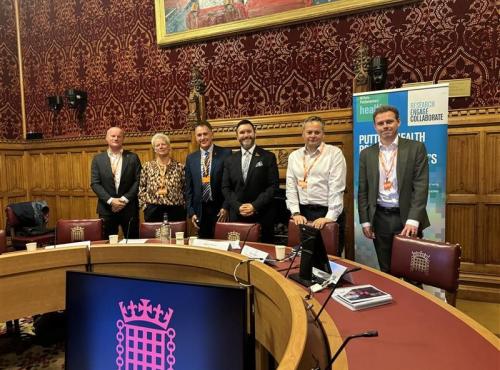Policy Connect - MMU: ImprovE-ACT Policy Briefing
The following recommendations have been developed using an amalgamation of Manchester Metropolitan Universities main research findings and Policy Connects’ Policy Symposium and expert discussions (please refer to event summary document for more information).
Conclusions/Outcomes
The following outcomes have been recommended as a means of actions to be implemented to ensure improved experiences for black men detained under the mental health act.
- To ensure culturally competent care, develop humility training in collaboration with mental health professionals, including police officers, focusing on diverse cultural perspectives. This multidisciplinary approach will integrate cultural awareness into existing frameworks with support from organizations like the Royal College of Psychiatry and the Royal College of Nursing. Additionally, address resource gaps and combat intrinsic racism by tailoring training sessions to tackle institutional racism and systemic oppression within police forces.
- To ensure inclusive mental health support, establish core specifications for community-based Mental health hubs focusing on psychosocial approaches and creative practices. These hubs, following a community support model, will integrate culturally relevant services through collaboration with faith leaders and community organisations. Modern technology will be utilised for accessibility and engagement, ensuring these hubs serve as safe spaces for black men to address isolation and foster social connections.
- To ensure effective advocacy and complaints mechanisms in mental health care, extend cultural advocacy across legislation, recognising its role beyond legality to represent individual needs and promote recovery. Address biases through human rights-based approaches and improve reporting mechanisms for incidents of racism and discrimination. Promote partnership working to empower communities and individuals in advocating for equitable access to mental health services.
- To ensure that trust between the police and black communities is rebuilt, implement national strategies like the "right care, right person" approach and race equality action plans. Provide training to police on recognising and addressing PTSD symptoms, acknowledging, and addressing the fear and triggers associated with police interactions among black men.
- Revise the Mental Health Act assessment process to prioritise positive outcomes and strength-based approaches, incorporating individual needs, cultural understanding, and spiritual beliefs. This should be done by challenging institutional biases against black men, advocate for transcultural medication frameworks, and develop culturally sensitive medication practices with healthcare professionals. Furthermore, introducing advanced choice documents for individuals to express care preferences, reducing detention risk and promoting culturally appropriate advocacy.
Policy Recommendation
After conducting comprehensive research, it has been unequivocally concluded that the core recommendation is that lived experience must be placed at the forefront of research, policymaking, and reform processes within the mental health sector. The research highlighted a critical lack of resources for accessing individuals with lived experience, hindering the confidence of stakeholders, including researchers, policymakers, and mental health boards, to drive systemic reform. Conversely, individuals with lived experience express a strong desire to play a central role in the reform process, beyond merely being subjects of study. They seek genuine empowerment to lead and influence change within mental health systems, ensuring that their voices are heard and acted upon.
To address these findings and facilitate tangible change, we recommend the establishment of a Lived Experience Commissioning Group/Council. This commissioning group, modelled after the successful Disabled Student Commissioning Group, will serve as an independent consultancy body, advising key stakeholders such as the Care Quality Commission (CQC), Department of Health and Social Care (DHSC), policymakers, and leading mental health boards across the nation. With an initial budget allocated for three years, this group will be co-chaired by an officially appointed Mental Health Ambassador to signify endorsement from the DHSC.
Comprising ten full-time paid positions filled by individuals with lived experience including black men who have experience of having been detained under the Mental Health Act, the commissioning group will possess the authority to provide guidance, scrutinize policies, commission focused research, and enact meaningful changes within the mental health sector. These individuals will rotate periodically to prevent trauma and burnout and ensure diverse leadership.
The commission calls upon mental health care providers, government bodies, funders, agencies, regulators, and professional bodies to adopt and promote its recommendations. Specifically, the group will focus on advising, informing, and challenging the mental health service/commissioners’ sector to enhance support models for individuals experiencing crisis, particularly those detained under the Mental Health Act. Additionally, the commission will identify and promote effective practices to ensure positive experiences for individuals detained under the Mental Health Act.
The primary objective of the Lived Experience Commissioning Group is to enhance the experiences of individuals with mental illness within mental health care settings, with lived experience at the forefront of reform efforts. The group would advocate for:
-
Improved support models for individuals experiencing crisis, particularly those detained under the Mental Health Act.
-
Identification and promotion of effective practices to ensure positive and successful experiences for individuals detained under the Mental Health Act. Additionally, the commissioning group would have a dedicated section with allocated funds to concentrate on resources to address issues of racism, disparities, and detention rates, with a particular emphasis on the experiences of black men detained under the Mental Health Act.
-
This Commissioning Group will also serve as a race and mental health advisory group to the CQC, offering insights on improving its monitoring functions concerning the Mental Health Act's impact on black men.
-
It would serve as a race and mental health advisory group to the CQC, offering insights on monitoring the Mental Health Act with regard to black men and other minority groups.
While initially focusing on mental health, the commissioning group has the potential to expand its scope to other areas in the future. However, its core mission will remain centred on mental health, ensuring that lived experience continues to guide and inform policies and practices within the sector.
For more information on the ImprovE-ACT research project, please contact Jasmin.adebisi [at] policyconnect.org.uk.
This study/project is funded by the NIHR [PRP (26-02-02) Improving patient experiences and outcomes under the Mental Health Act. Ref 201715]. The views expressed are those of the author(s) and not necessarily those of the NIHR or the Department of Health and Social Care.




